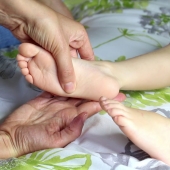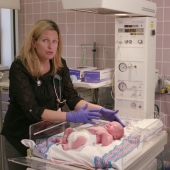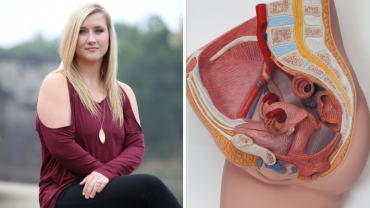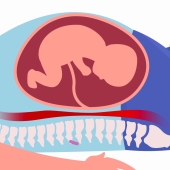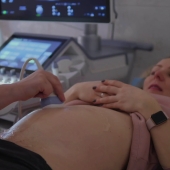Julie Moran: It's most known in the medical community by its four letter abbreviation, HDFN, or Hemolytic Disease of the Fetus and Newborn. As recently as the mid 1906s, HDFN would cause nearly 10,000 infant deaths a year in the United States.
HDFN has been virtually eliminated in developed countries thanks to an intervention that could prevent it from happening, which we're going to learn and talk about today.
Dr. Larry Griffin is an Obstetrician with Women's Care Physicians of Louisville. He's an Associate Clinical Professor at the University of Louisville School of Medicine, and Former Director and Vice President for the American College of Obstetricians and Gynecologists.
You know, HDFN, let's begin with that. Really, just explain to me right off the bat what it is?
Dr. Larry Griffin (OBGYN, Women's Care Physicians of Louisville): HDFN begins with a blood type mismatch between a pregnant mother and her developing baby. Each of our blood cells carries a set of proteins that determine our blood type. One of those proteins called rhesus, Rh, or D antigen can cause an immune reaction in Rh negative women who don't have that protein on their red blood cells. Here's the scenario.
When an Rh negative mother is pregnant with an Rh positive baby, during nearly all pregnancies a small number of fetal red blood cells cross the placenta and enter the maternal circulation. The initial immune reaction typically doesn't cause a problem with an Rh negative woman's first pregnancy, but she's now considered sensitized.
During the next pregnancy with an Rh positive baby, the continued response results in antibodies that cross the placenta and destroy the Rh positive red blood cells and the developing fetus, leading to HDFN. HDFN pregnancies are at high risk of fetal anemia, still-birth, and serious neonatal and pediatric complications including disability or death.
Doctor, before 1968, over 10,000 babies died each year in the United States due to HDFN. Tell us really how things have changed when scientists developed a product that could prevent Rh sensitization.
Dr. Larry Griffin (OBGYN, Women's Care Physicians of Louisville): It turns out that giving Rh antibodies, referred to as Rh immunoglobulin to Rh negative women before they're exposed to Rh positive blood can prevent the development of that response. The first Rh immunoglobulin product approved in the U.S. was RhoGAM.
RhoGAM is a prescription medicine that your doctor can prescribe if it's right for you. When administered at the right times, RhoGAM can drastically reduce the incidents of HDFN. There are some general safety considerations that you should know.
RhoGAM should always be given to the mother and never to the baby. Adverse events after administration of RhoGAM are rare, but there is a risk of allergic reactions if you've had an allergy to immunoglobulins or if you have an IgA deficiency.
Adverse reactions may include redness, swelling, mild pain at the injection site, and some patients have experienced elevated body temperature following administration. You're encouraged to talk to your doctor if you experience any of these symptoms after receiving RhoGAM.
Now because HDFN affects babies of women who are Rh negative, what do they need to know in order to proactively ensure they're getting Rh immunoglobulin at the right time during their pregnancy?
Dr. Larry Griffin (OBGYN, Women's Care Physicians of Louisville): The American College of Obstetricians and Gynecologists recommends that Rh negative women be given a dose at 28 weeks of pregnancy and another dose after delivery if the newborn's Rh positive. Women should also be aware that if they undergo any type of invasive procedure, such as amniocentesis or have any significant abdominal trauma, an additional dose may be required.
Well based on what you've told us, Rh immunoglobulin was a game changer in the field against HDFN. Tell us, Doctor, something about how this life saving product is made.
Dr. Larry Griffin (OBGYN, Women's Care Physicians of Louisville): Rh immunoglobulin is purified from human plasma from specific donors who have anti Rh antibodies circulating in their bloodstream. It's important to point out that since all plasma derived products are made from human blood, they may carry a risk of transmitting infectious agents such as viruses and theoretically the Creutzfeldt-Jakob disease agent. So far, there have been no documented cases of viral transmission with RhoGAM.
And joining us now is Ellen Conrad, a woman whose personal experience initiated her lifelong commitment to helping other women and their babies. Ellen, I want to thank you so much for coming in. We loved talking to the doctor. And right off the bat, I just want you to tell us your story.
Ellen Conrad (Actual Donor): My first pregnancy was easy. It resulted in a healthy baby boy. The next pregnancy was a much different story. I get emotional now, 44 years later, as I think of how close we came to losing the second son.
During my first pregnancy, Rh immunoglobulins were not available. When I became pregnant again, my doctor explained to me that my Rh negative blood was attacking the blood of my baby in my womb. At that time, the treatment for HDFN was blood transfusions.
The hospital was ready with life saving blood transfusions as soon as my son was born. My son had two transfusions in the first days of his life. After the Rh antibody cleared his system, he developed into a normal healthy baby.
Oh, I know that was hard for you to tell. That's just such an emotional story. And how is it that Ellen, because of her history with HDFN, is such a valuable resource for other Rh negative mothers today?
Dr. Larry Griffin (OBGYN, Women's Care Physicians of Louisville): Well, Ellen, like other Rh negative mothers who've had Rh positive children, is now sensitized and has anti Rh antibodies circulating in her bloodstream. These antibodies are collected to make Rh immunoglobulin. In the case ofn RhoGAM brand, source plasma comes from a group of approximately 400 donors. Plasma donations are collected at Somerset Labs.
Oh, and I've heard that Somerset Labs is a pretty special place. I know it is for you, Ellen. Tell us about that.
Ellen Conrad (Actual Donor): Well, Somerset Labs is a wonderful place, and all of the donors are proud to know that we are making a difference in the lives of pregnant women and their sweet little babies. We typically go twice per week to donate our plasma. Somerset is near Buffalo, New York, which is not known for great weather, but rarely stops us from getting there. The staff at Somerset care about us. We're like family. I've been donating my plasma for over 27 years, and it has been estimated that the plasma I have donated for RhoGAM brand has spared thousands of babies from HDFN.
That is just an amazing story. With all that you've been through and all that you've given back, is there anything, Ellen, that you'd like to share as we close for women watching today?
Ellen Conrad (Actual Donor): I'm just thankful that something very good came out of my trying experience and that I can make a difference.
Doctor, any final thoughts from you?
Dr. Larry Griffin (OBGYN, Women's Care Physicians of Louisville): All pregnant women, or women who are thinking of becoming pregnant, should get prenatal care including an evaluation of their blood type. I'd like women to know that there are options for preventing HDFN that can be discussed with their physician. RhoGAM is one such option. You can get more information from your doctor or by visiting RhoGAM.com
- 4763 views


